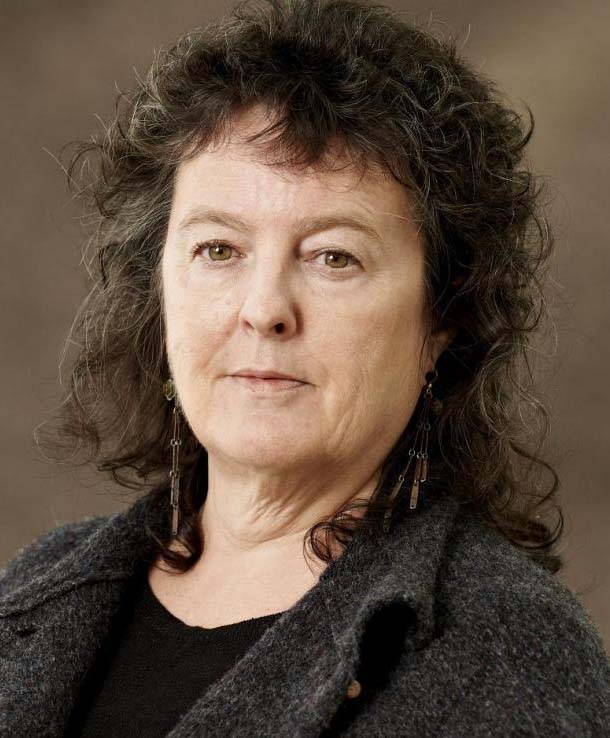Mrs Quasimodo’s Divorce (an excerpt)
. . . We lived in the Cathedral grounds.
The bellringer.
The hunchback’s wife.
The Quasimodos. Have you met them? Gross.
And got a life;
our neighbours – sullen gargoyles, fallen angels,
cowled saints
who raised their marble hands in greeting
as I passed along the gravel paths,
my husband’s supper on a tray beneath a cloth.
But once,
one evening in the Ladychapel on my own,
throughout his ringing of the seventh hour,
I kissed the cold lips of a king next to his queen.
Don’t ask me why.
Something had changed,
or never even been.
Soon enough,
he started to find fault.
Why did I this?
How could I that?
Look at myself.
And in that summer’s dregs,
I’d see him
watch the pin-up gypsy with her goat
dancing for the tourists in the square;
then turn his discontented, traitor’s eye on me
with no more love than stone.
. . . Where did it end?
A ladder. Heavy tools. A steady hand.
And me, alone all night up there,
bent on revenge.
He had pet names for them.
Marie.
The belfry trembled when she spoke for him.
I climbed inside her with my claw-hammer, my pliers,
My saw, my clamp;
and, though it took an antagonizing hour,
ripped out her brazen tongue
and let it fall.
Then Josephine,
his second-favourite bell,
kept open her astonished golden lips
and let me in.
the bells. The bells.
I made them mute.
No more arpeggios, or scales, no stretti, trills
for christenings, weddings, great occasions, happy
days.
No more practicing
for bellringers on smudgy autumn nights.
No clarity of sound, divine, articulate,
to purify the air
and bow the heads of drinkers in the city bars.
No single
solemn
funeral note
to answer
grief.
I sawed and pulled and hacked.
I wanted silence back.
– Carol Ann Duffy
This is a poem from Scotland. An eloquent example of the fresh new Scottish literature at the very end of the twentieth century. It is taken from the anthology New Scottish Writing edited by Harry Ritchie and published by Bloomsbury in 1996. Something bright and stirring as befits a new year.

The editor of the collection, Ritchie, explains it in an amazingly revolutionary introduction that may be unconventional, plain spoken, witty and even humorous, but very informative about the nature of the newest contemporary Scottish literature and the background of those who have written it.
This introduction itself is a work of art, and is worth reprinting in full, were there space in this publication. In his inimitable way, Ritchie explains the new energy in the writing, the ways in which it is representative of Scottish literature, and the working class quality in most of the writers.
“This introduction provides me with an unmissable opportunity to indulge in some patriotic bragging of my own, for this anthology is designed to celebrate the extraordinary boom now taking place in Scottish literature. So extraordinary is this boom that I have daydreamed about compiling what really would be a high quality, well populated and bulky anthology of work by contemporary writers from Fife,” he writes.
The anthology aims to “. . . give some indication of the richness and variety, the wit, verve and range of current Scottish literature. . . .many of the most important contemporary Scottish writers are, if not working-class, then certainly not posh.
“This is something of a phenomenon… The noticeably lower-class nature of some of its most prominent subject-matter, language, and authorial CVs has also encouraged claims that the wonderful upsurge in Scottish writing has somehow been propelled by . . . the political traumas of 1979.”
One of the notable and very interesting factors in the fiction is the “writing in a resolutely vernacular voice” in which the language is a popular non-standard working class dialect. This has been done with great success by novelists such as James Kellman and Irvine Welsh, leading Ritchie to remark that “the working class context of much contemporary Scottish literature has been so distinctive”. He ends up by admitting, “To tell the truth, though, like everyone else I don’t really know why or how Scottish writing has so many great talents”.
Foremost among these great talents is surely Carol Ann Duffy, who is the best known Scottish poet represented in this anthology. In fact, she is among the leading and most established poets in Great Britain as a whole and lives in London at the centre of English Literature. She was appointed English Poet Laureate in 2009, has won a number of literary prizes, and is a professor of poetry at Manchester Metropolitan University.
The selected poem reflects the work celebrated in New Scottish Writing. In “Mrs Quasimodo’s Divorce” the persona narrates in colourful language (not included in these parts of the poem) the break-up of her marriage to the local cathedral bellringer due to his changed attitude and ill-treatment, and the revenge she extracts by dismantling his church bells. There is a sense of gender related injustice, a personification of the bells and a brief intertextual reference to Edgar Allan Poe in “The bells. The bells. /I made them mute”. She silences Poe’s overpowering bells which represents so many different personalities and terrors.
But just how different is today’s Scottish literature from the traditions of old? Surely some of the greatest contributions to British literature are the old Scottish ballads, which were the oral literature of the folk. Burns was the greatest poet from Scotland, one of the stalwarts of English literature, who wrote in the vernacular and drew from the oral poetry collected in the field. Among his work is much of the language and voice seen in these new writers of Scotland.





